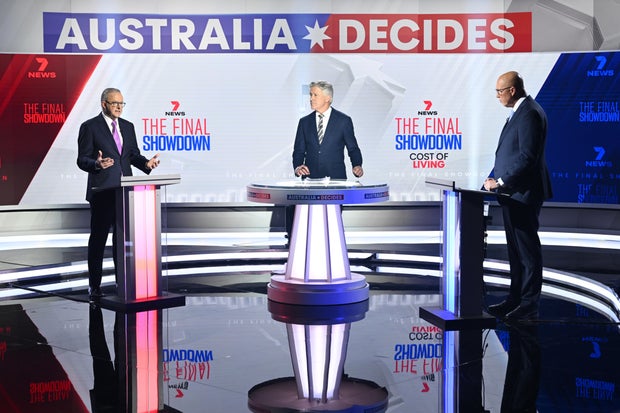In a national election that has captured not only Australian interest but also global attention, Australians cast their votes over the weekend. This election seems markedly influenced by international political dynamics, especially by U.S. President Donald Trump’s policies and rhetoric. Under the shadow of these global influences, local parties and leaders position themselves either in alignment or in opposition to Trump’s contentious strategies.
As the polling stations opened, from the bustling city centers of Sydney and Melbourne to the quieter reaches of Western Australia, the turnout was a testament to the engrossed public interest. The voting process was smoothly underway by 8 a.m. local time on the eastern coast, drawing to a close by 6 p.m., while voters in Western Australia had until 8 p.m. to cast their ballots.
This Australian electoral showdown comes on the heels of the Canadian elections, where Trump’s influence was palpable. Canadian Prime Minister Mark Carney had surged in the polls, effectively countering Trump’s aggressive tariff threats and dismissive remarks about Canada potentially becoming a “51st state.” This resurgence of support for Carney saw the aspirations of Pierre Poilievre and his Conservative Party dashed, continuing the Liberal Party’s decade-long governance streak.
In Australia, the political winds have similarly shifted. The center-right Liberal-National Coalition, once favorably poised to seize or maintain power, faced a staggering slip in public support since Trump’s second-term inception. A recent YouGov poll starkly highlighted this decline, showing the Coalition lagging behind the Labor Party by 4.4 points. Peter Dutton of the Liberal Party, shadowed by his campaign’s Trump-like focus on economic rhetoric, advocated for cuts in government waste and a mandate to have federal workers return to office spaces. Yet, this mimicry of U.S. policy measures did not resonate well with the Australian electorate, as many perceived it unfavorably.
Alan Tidwell, a professor specializing in Australian, New Zealand and Pacific studies at Georgetown University, observed that Dutton’s emulation of Trump’s strategies did not bode well with Australian voters. This sentiment was reflected in the polling data and public discourse. Meanwhile, Australia’s center-left Prime Minister Anthony Albanese, potentially threatened by economic uncertainties in the post-pandemic era, found an unexpected boon in Trump’s unpopularity and Dutton’s allied stance with current U.S. policies. Despite avoiding direct criticism of Trump, during debates and interviews Albanese maintained a diplomatically cautious posture, assuring that he trusted leaders like Trump and Xi Jinping alike, and expressed intentions to diplomatically engage with his U.S. counterpart post-election.
While grappling with domestic electoral dynamics, significant international relations continue to hue Australian policy and public sentiment. For instance, the tension surrounding trade tariffs instigated by Trump’s administration has become a focal point of international debate. Senator Mark Warner from Virginia raised concerns about the indiscriminate nature of these tariffs, which potentially strain relationships with longstanding allies like Australia, questioning the rationale behind these decisions in sessions addressing U.S. trade policies.
Australia’s relationship with major economies like the U.S. and China plays a critical role in its strategic positioning and economic policies. The Australia-United States Free Trade Agreement, effective since January 2005, underscores the deep-seated economic ties between the two nations. Meanwhile, the increasing influence of China in the Indo-Pacific region poses both economic opportunities and strategic challenges, prompting Canberra to reassess its security and trade policies.
On the defense front, the AUKUS agreement—a tripartite security pact between Australia, the U.K., and the U.S.—formalized in 2021, illustrates a significant commitment to shared regional security goals, especially in counterbalancing China’s growing military assertiveness. The pact facilitates Australia’s acquisition of Virginia-class nuclear submarines, bolstering its naval capabilities well into the 2030s. Nishank Motwani, a senior fellow at the Australian Strategic Policy Institute USA, emphasized the importance of AUKUS in reinforcing Australia’s defense posture, advocating for increased defense spending as a testament to Australia’s commitment as a responsible ally in this volatile region.
Public trust in U.S. initiatives, however, has notably declined within Australia. A Lowy Institute survey recorded a significant drop in Australians’ confidence in the U.S. to act responsibly on the global stage—a historic low in two decades of polling data. This growing skepticism understandably stirs concern about the future implications of international dynamics, influenced markedly by Trump’s foreign policy directions.
In summary, as Australians went to the polls amidst these complex layers of domestic and international crosscurrents, the election not only reflected internal political allegiances but also underscored the broader implications of international political influences, particularly those emanating from the U.S. under President Trump’s administration. The outcome of this election is poised to determine Australia’s navigating trajectory through these daunting yet pivotal global and domestic challenges.









